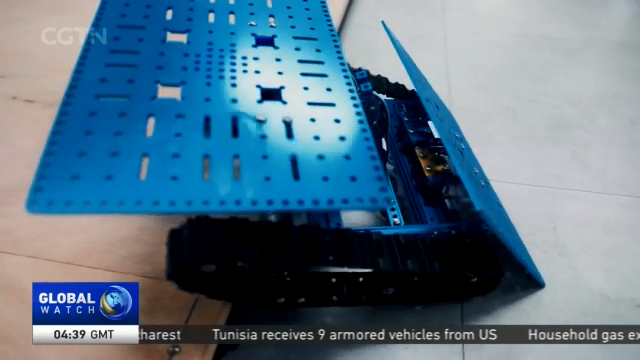
13:25, 23-Jun-2018
Fast Track to the Future: What start-ups are doing and thinking in China and the US
04:13

In the US and China, start-ups are considered among the most innovative, dynamic and energetic sectors. Our reporter Ge Yunfei recently visited the most startup-vibrant regions in the world-the American and Chinese "Bay Areas".
Shenzhen - in southern China's "Greater Bay Area" - is considered the country's Silicon Valley. And here in the city, a group of young people are kicking off an engineering competition called "Makerathon"-a combination of the words, "makers" and "marathon."
These contestants will test their wits - and endurance - to build a robot in the next 24 hours without sleep.
JASEN WANG FOUNDER & CEO, MAKEBLOCK "Human evolution is driven by creativity. And what we're doing is to help more people explore their potential to create."
This competition is an annual event organized by a start-up called Makeblock-a global leader in robotics and education. The company's founder, Jasen Wang, has some questions for his U.S. counterparts.
JASEN WANG FOUNDER & CEO, MAKEBLOCK "The question that I'd like to ask about the U.S. start-ups are what are hottest start-up areas right now in the U.S. And what are the new generation of entrepreneurs thinking at the moment "
GE YUNFEI SAN FRANCISCO "This is the Soma District in San Francisco. Within a mile, there are lots of unicorns like Uber, Lyft, and Dropbox. And downstairs in the incubator, dozens of companies are striving to be one of them."
The incubator is called OnePiece Work. Ranging from artificial intelligence to big data, over 200 companies are now registered here.
It was founded by this man, Guo Wei, a Silicon Valley-based angel investor. He's financed over 300 start-ups across China and the U.S.
Guo listed four of the most popular areas in the U.S. for start-ups.
GUO WEI, VENTURE CAPITALIST ONE PIECE "Software to business, biotech, space tech, and blockchain. And the U.S. start-ups tend to more focus on one certain industry or a certain product."
Apparently, start-ups in China and the U.S. have already reached some consensus at least on one technology- blockchain. Though Jasen Wang is skeptical.
JASEN WANG FOUNDER & CEO, MAKEBLOCK "Now the P2P financing, internet finance and the blockchain are definitely the hottest in China. But, I think many of those startups are just doing usury. Of course, it can make quick money, but it's not valuable to the society."
Though Silicon Valley has a booming business in space tech and biotech, most of the start-ups here are still somewhat "SOFT" when compared to their Chinese counterparts.
GUO WEI, VENTURE CAPITALIST ONE PIECE "Smart software is going down here in the Silicon Valley. The cost of building hardware is so expensive that I don't think the start-ups in the U.S. have the opportunity to do that."
China, on the other hand, has been the world's factory for decades. Making hardware is exactly what the Chinese companies are good at.
JASEN WANG FOUNDER & CEO, MAKEBLOCK "China's supply chain brings a special advantage in the field that requires combination of software and hardware. In terms of making hardware products, we're much more competitive than overseas players."
But it seems in both countries, start-ups are facing some of the same problems. When tech companies cluster in hubs like Silicon Valley, it drives up the cost of living.
GUO WEI, VENTURE CAPITALIST ONE PIECE "The Silicon Valley becomes centralized. Young people they are not able to afford the living cost here. The environment is slowly getting worse. And too much capital here creates a startup bubble."
JASEN WANG FOUNDER & CEO, MAKEBLOCK "I think the world is facing the same situation. Big companies like Alibaba and Tencent are growing bigger and bigger, even with an annual growth rate of 30%-40%. That, in fact, leaves a smaller market for the start-ups. I don't see any solution to this problem."
Back in Shenzhen, this small, unmanned robotic kitchen is one of the winners. Out cauldrons of competition and creativity like this one may come the next billion-dollar idea! Ge Yunfei, CGTN, from Shenzhen and San Francisco.

SITEMAP
Copyright © 2018 CGTN. Beijing ICP prepared NO.16065310-3
Copyright © 2018 CGTN. Beijing ICP prepared NO.16065310-3